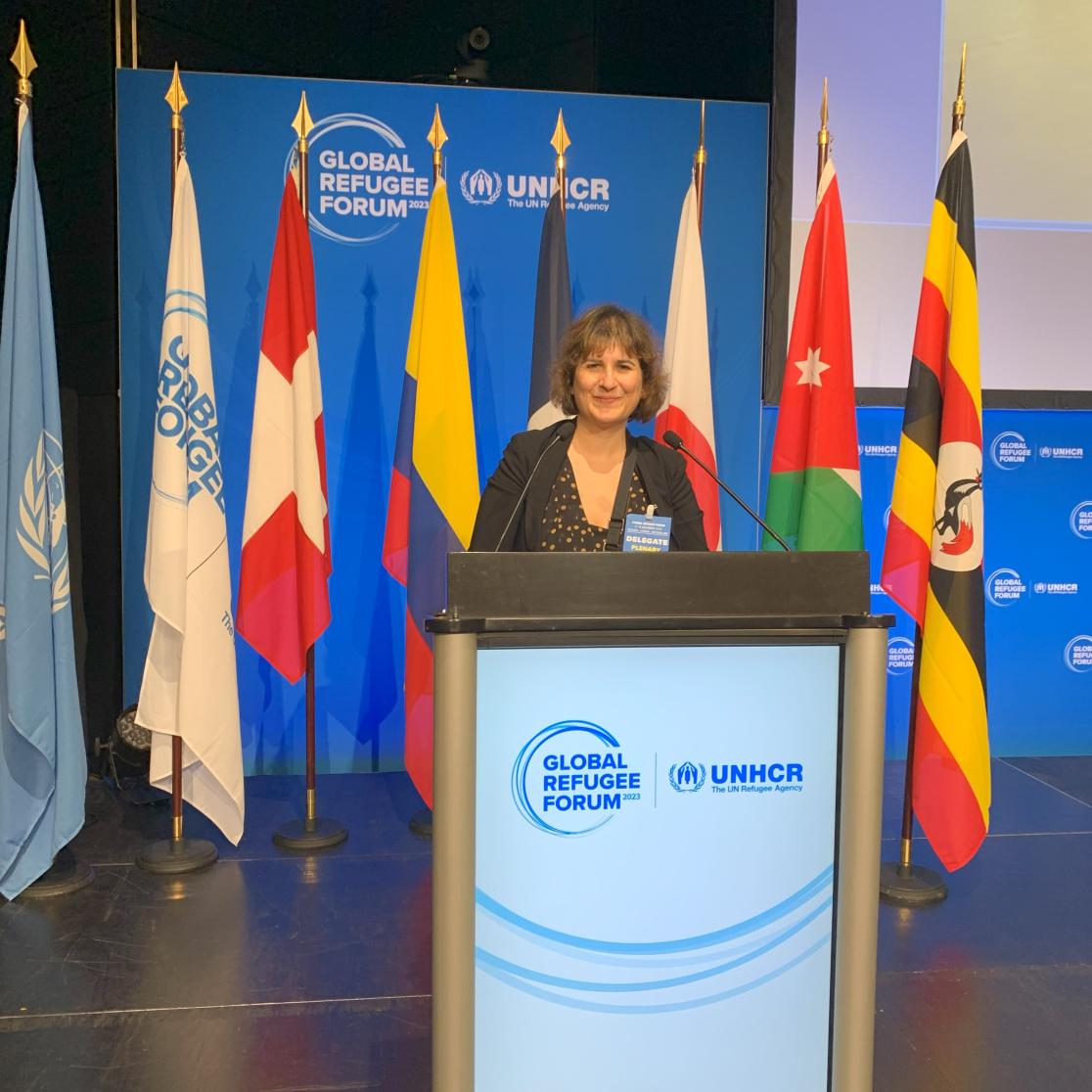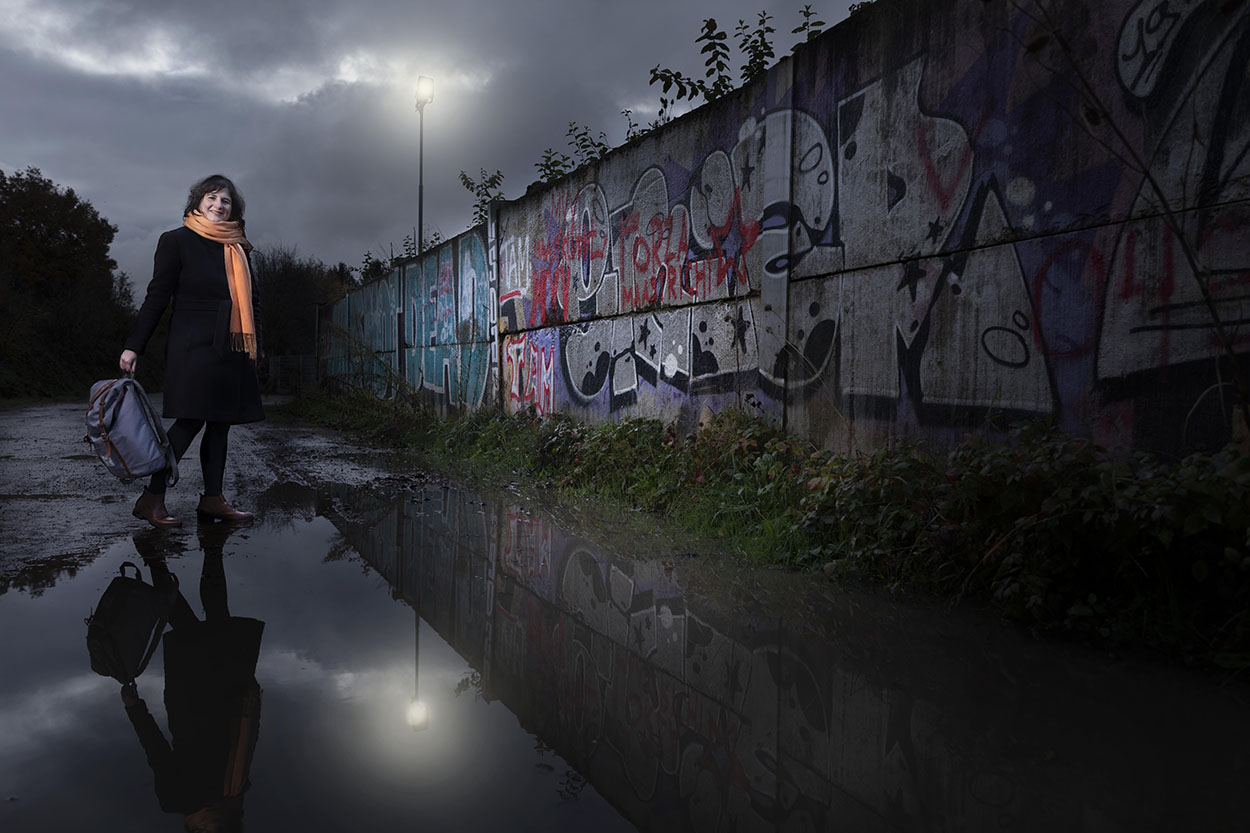“Europeans are not anti-migrant!”
Egalitarian, European, and currently busy ending the legal confusion around migration. Lilian Tsourdi, Professor of European Migration Law and Governance, on her long journey to UM.
How much of a problem with migrants do Europeans have? “I think the share of ideological racists is insignificant,” says Lilian Tsourdi, Professor of European Migration Law and Governance. “Yes, there is a fear of the unknown; but we see that in urban centres, where people have regular social interactions with migrants, the prejudice decreases. There is, however, a lot of frustration with underlying problems of social inequality, which populists have managed to displace onto migrants. They instrumentalise e.g. the lack of social housing to pitch socially disadvantaged populations against one another.”
Tsourdi researches the impact of European harmonisation. “Policy solutions remain fragmented; the EU has competences on migration and asylum, while e.g. social welfare is not harmonised at the EU level.” She empirically researches more centralised forms of funding for implementing e.g. asylum and external border controls. “Providing asylum is a regional public good which benefits all Member States across the EU. It shouldn’t depend on national budgets of the states most tasked with receiving and integrating migrants.”
Tsourdi rejects taboos against the EU providing international protection or working with third countries, “so long as it’s in mutually beneficial co-development partnerships. There’s already an awareness that a purely Eurocentric security approach isn’t working – we need something more holistic. But more than anything, we need solutions that tackle, poverty, homelessness, exclusion – not just of migrants, but in general.”
Very European at the fringes
The daughter of medical doctors, Tsourdi grew up in Athens and enjoyed many trips around Europe throughout childhood. “I had the chance to develop a very open mindset,” she says, conceding, however, that parts of her school curriculum were flirting with ethnonationalist exceptionalism. For all the national pride and peripheral position, however, Greece is fervently pro-EU. “Even at the height of the financial crisis, public opinion polls showed that around 70% wanted Greece to stay in the EU.”
Studying law at undergraduate level in Athens a bit more than twenty years ago presented challenges. “Back then, it was very hierarchical and several core curriculum courses consisted in lectures to several hundreds of students; assessment relied exclusively on rote learning,” she remembers and interrupts herself: “I think that’s why I love the educational model at UM: working together in small groups, thinking critically, applying knowledge to solve real problems, allows me to give students some of the learning opportunities I did not experience as an undergraduate student.”
Joining student organisations like Model UN, AEGEE, and the board of AIESEC offered some reprieve. “Most of my creativity and initiative went into that.” During an ERASMUS exchange semester in Vienna, Tsourdi took a consequential elective on human rights. “I was really passionate and discovered my direction, which gave me the motivation to pull through”. Upon her return to Athens, she took electives in human rights and in public international law. These specialised courses in smaller group settings were more conducive to critical thinking, and expert professors and students alike were motivated. This led her to follow a specialised LLM in Public International Law in Athens.
Migration, policymaking, and research
Next to the LLM, Tsourdi wanted to focus on what she saw as the most pressing human rights issue of the time: migration. “In 2006, I started interning with the NGO Greek Council for Refugees, providing individual legal advice to asylum seekers. There wasn’t a functioning asylum system yet. We had to decide whom to help first.” Often advocating for decent living conditions for those lingering in legal limbo was all she could do. “There was a sense of helplessness. At the same time, I was inspired by the dignity and determination of those asylum seekers – it marks my research to this day.”
After completing her second LLM on human rights law in the UK, Tsourdi started working in asylum law policy and advocacy with civil society organisations in Brussels to experience more legal practice for a number of years. Torn between the world of practice and academia, she started to conduct research as an unfunded external PhD candidate at the Université Libre de Bruxelles, while working for an MEP who was tasked with being the (shadow-) rapporteur in several asylum-related files. “Contributing to negotiations around asylum reform showed me the inner workings and limitations of the process,” she says, referring to the amount of package deals, i.e. horse-trading, going on in the background.
To pursue a more analytical and critical angle, Tsourdi abandoned her parliamentary career path and started working full-time on her PhD. “My PhD supervisor, Philippe De Bruycker, is a keen networker, and very active in EU-funded projects and consultancies. I helped raise and implement externally funded research assignments; that’s what gave me this entrepreneurial spirit. I learned early on to construct projects and research lines around ideas together with partners. I still like the creativity of working like this.” Her doctoral research focused on the evolution and implementation of EU asylum policy. “Again, because of my practical experiences, I always look at how legal frameworks are implemented on the ground. I enjoy deeper, conceptual work and empirical research, but I’m still active as a consultant for institutions.”
Recognising everyone’s contribution
Tsourdi spent the last three semesters of her PhD at the European University Institute’s Migration Policy Centre in Florence, where she met her mentor, Maastricht University’s Bruno de Witte. She stayed on at the EUI as a Max Weber postdoctoral fellow for another year. “Bruno is not only among the sharpest legal minds in the field of EU law, he is also a kind, accessible and genuinely considerate mentor, who has empowered numerous scholars to fulfil their potential. He has inspired me to evolve as a scientist and as a mentor”.
Tsourdi then joined Oxford’s Refugee Studies Centre as a departmental lecturer. While enjoying her time and the intellectual environment there, Tsourdi’s egalitarianism became apparent in the face of formalised hierarchies, such as high-table dining. “I still feel like that. Becoming professor is a special recognition of my achievements, but I don’t think it defines me. It’s an honour to be a liaison for the faculty and for people across faculties working in the same area.” While praising Maastricht University’s flat hierarchy, she thinks it can still do better. Since her time serving in the Maastricht Young Academy, she supports “Iedereen professor!”, a campaign seeking to equalise, to the greatest extent practicable, rights across professorial ranks. “It’s really important to recognise everyone’s contribution and this is a pragmatic way of doing that.”
A truly European region
Tsourdi arrived at Maastricht University in 2019 with a Veni grant. “I really like the international environment – it feels truly European. Oxford was also international to an extent, but I was the only non-English native speaker at the section. “I also like how education and research are equally important here in Maastricht.”
Moving to Maastricht is not on the cards, though. “Yes, I absolutely speak Dutch with a Flemish accent,” chuckles Tsourdi, sitting up a little straighter in her chair. She met her husband 16 years ago in Belgium and has been based there at least for part of the year ever since. They now live in Leuven with their young son. This sense of belonging is for her a matter of emotion, not a moral affair – certainly not a legal one. As she has known for a long time, behind every migration statistic is a person seeking to live a good life.
Text: Florian Raith


Also read
-
Shuo Li guest researcher at IGIR
Dr. Shuo Li will visit IGIR for one year, between October 2025 and October 2026. Her current research focuses on China and international arbitration.

-
Globalisation & Law Network seminar with Giuseppe Martinico
On 23 October 2025, the Globalisation & Law Network, together with the Maastricht Centre for Law & Jurisprudence, organised a seminar featuring Giuseppe Martinico (Sant'Anna School of Advanced Studies, Pisa).

-
Overriding Mandatory Rules in International Commercial Arbitration, a Comparative Study between France, Switzerland, England and Egypt
PhD thesis by Ibrahim Shehata
